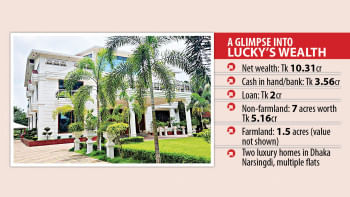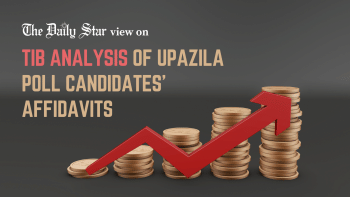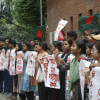We can't let the Matiur family drama obscure the bigger picture

Another day, another unsavoury disclosure about a holder of public office. As we wonder whether the government will ever take its "zero-tolerance" policy against corruption seriously, the media has revealed the latest in a series of recent scandals involving potential abuse of public office that has—as its protagonist—a female upazila parishad chairman, at Narsingdi's Raipura upazila. According to a report by this daily, Laila Kaniz Lucky, also a retired government college teacher, has substantial wealth that does not align with her known sources of income. Fittingly titled "How Lucky got so lucky!", the report delves into the many discrepancies in her financial declarations.
Her wealth statement, filed with the Election Commission before this year's Narsingdi upazila polls, claims she is worth Tk 10.31 crore. However, detailed investigations suggest her actual wealth could be dozens of times higher. Her properties include extensive land holdings and multiple flats in prime locations in Dhaka, but those have been massively undervalued. Certain assets were also omitted, such as her co-ownership of the Wonder Park and Eco Resort, a sprawling green expanse with a lake and lakeside cottages, or her lavish mansion with an approaching road named after her. This further deepens the suspicion of financial misrepresentation. For a public representative who only broke into politics in recent years and lives on a pension of Tk 4.65 lakh per year, having so much wealth indeed raises eyebrows.
This is where ongoing speculations surrounding her husband make better sense. Lucky is married to Matiur Rahman, a high-ranking official at the National Board of Revenue (NBR), who recently came under the spotlight after his son from his second marriage posted about an expensive sacrificial goat on social media. NBR sources and documents seen by The Daily Star suggest that he along with his close and distant family members have amassed great wealth, including shares and stakes in various companies. Matiur has now been removed from his NBR post, and an investigation by the Anti-Corruption Commission (ACC) is underway. But given Lucky's questionable tax filings, one cannot shake off the suspicion that Matiur might have used her as a vessel or front to obscure their wealth and avoid scrutiny.
All this indeed deserves a thorough investigation. The Lucky revelations have again brought to the fore three sociopolitical trends: the growing number of superrich politicians and public officials in Bangladesh, gross undervaluation of assets in affidavits submitted by political candidates to election authorities, and widespread corruption in public sector—all of which are going unchecked. Recent disclosures about the alleged involvement of retired top security officials in various irregularities have further underscored the lack of accountability for those holding public office and the corrupt influences of power. We must check these disturbing trends. We must ensure that those in public office are held up to the highest standards of integrity, accountability, and transparency.


 For all latest news, follow The Daily Star's Google News channel.
For all latest news, follow The Daily Star's Google News channel. 










Comments